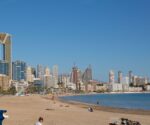‘I’m a British expat in stunning European seaside city – it’s been turned into Disneyland’ | World | News
Once a serene coastal haven known for its medieval walls and UNESCO World Heritage status, the city of Dubrovnik now grapples with overcrowded streets and landmarks, tourist tat shops and a growing strain on local resources and infrastructure.
The Croatian city’s fame was not helped by its prominent role as a filming location for the hit TV series Game of Thrones. When it aired, the city’s popularity surged as fans flocked to see the iconic sites in person.
In a new BBC series, “The Balkans: Europe’s Forgotten Frontier”, Katya Adler travelled Dubrovnik, where she met with a British expat who shared his frustrations that his hometown has been “colonised by tourists”.
Residents are now hugely outnumbered by tourists, often by more than 30 to one – one of the highest rates in Europe.
Marc van Bloemen moved to Dubrovnik from the UK when he was young and his family has lived in the same house by the harbour for four generations.
As soon as Adler stepped off the boat, she was swallowed by the massive crowd that pours off the endless stream of tourist coaches.
“They’re all flowing into the town,” said Mr van Bloemen, adding that this sea of coaches arrive “all day”.
In the high season, he revealed, “we avoid literally everything,” and never he sets foot in the busiest parts of the city. “We hibernate at home.”
The streets are now lined with tourist tat shops, selling magnets, postcards and “tacky” t-shirts: “It’s all about tourism,” the expat explained. “95% of all the shops.”
“It’s like Disneyland. It’s a theme park,” he added. “In any of these shops here,” as the camera pans to shop displays of rubber ducks holding ‘I love Dubrovnik’ placards, “there’s nothing to do with Croatia.”
While it cannot be denied that these huge numbers of tourists – 1.35 million visitors and over 4.2 million overnight stays in 2024 – bring in large amounts of cash, tourism now makes up 80% of Dubrovnik’s economy.
Dubrovnik is now almost entirely reliant on outsiders, creating problems for locals.
“Lots of professionals are leaving,” revealed Mr van Bloemen. Due to the high cost of living, “a flat costs double than somewhere else.”
In the last 30 years, the number of residents living in the Old Town has fallen by two-thirds.
“We’ve gained easier access from Western European countries coming to Croatia [through the European Union],” Mr van Bloemen explained, which brought the country out of the shadows of its dark Yugoslavian past and put it on the map.
While it is understood that Croatia’s joining the EU in 2013 has benefited much of Croatia, some locals in Dubrovnik are crying out for more regulation and limits on the number of cruise ships that now flood the city with tourists.
“It’s not fair for the city. We should look after it and leave it as a better place,” argued the expat. “Now we’re not leaving it for the next generation. If you lose the population, those people are not going to come back.”









